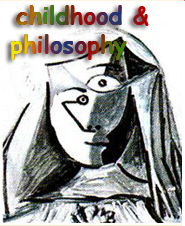on the philosophical narrative for children
Keywords:
Philosophical Novel, Thought Experiments, Allegory, ArgumentationAbstract
Given the obvious differences between telling a story and setting out a philosophical theory or a carefully reasoned argument, the philosophical narrative is, on the face of it, an unlikely genre. It is rendered even more problematic when we come to the philosophical narrative for children, with philosophy and children being, in the eyes of tradition, an equally dubious combination. The philosophical novels of Matthew Lipman and others constitute an existence proof that such a genre is possible, of course, but the mere fact that the attempt has been made does not nullify the claim that the form is disfigured or misbegotten. Indeed, without further examination, who is to say that the philosophical narrative for children is not a mongrel as both philosophy and literature, or that it can be called philosophical only by courtesy? In what follows I remark briefly on what makes writing philosophical and then apply those remarks to the philosophical narrative for children in order to explore both the difficulties and allure of the genre.Downloads
Published
2015-06-19
How to Cite
cam, philip. (2015). on the philosophical narrative for children. Childhood & Philosophy, 11(21), 37–53. Retrieved from https://www.e-publicacoes.uerj.br/childhood/article/view/20714
Issue
Section
special issue




